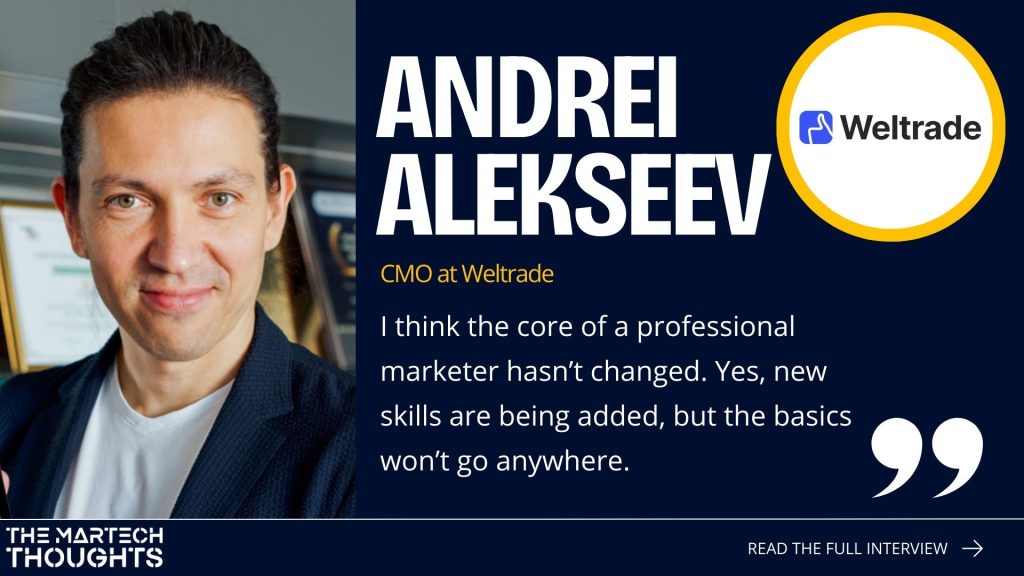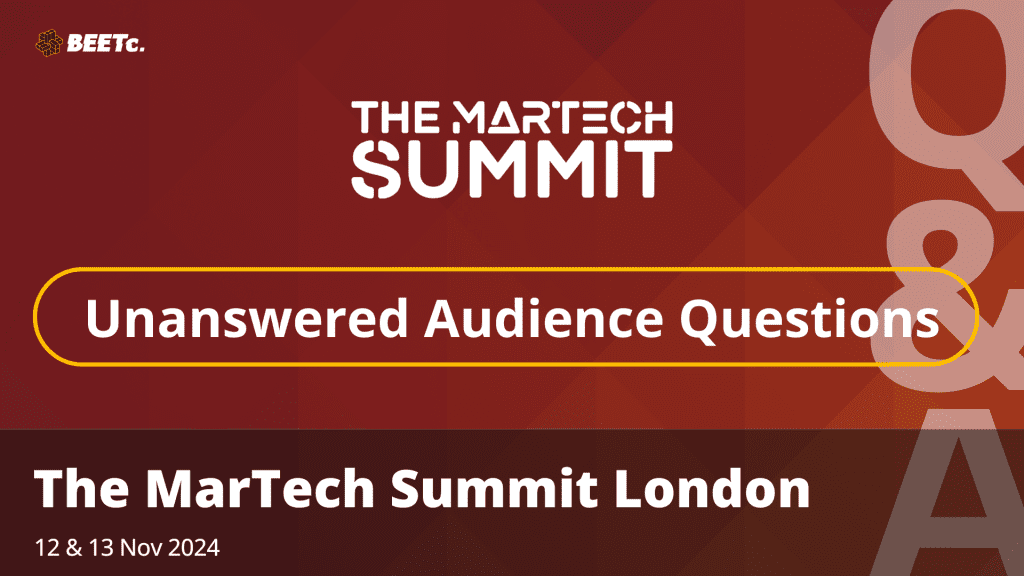
Marketing Insights from Andrei Alekseev: Navigating the Future of Digital Marketing in FinTech
Andrei Alekseev, Chief Marketing Officer at Weltrade, brings 20 years of marketing experience, with 14 years specifically in FinTech. His diverse background spans sports betting, online trading, binary options, crypto start-ups, and financial brokers. In a candid interview, he shared profound insights into modern marketing strategies, technological innovations, and the evolving landscape of digital marketing.
A bit more information
Q: Reflecting on 2024, what is one MarTech decision you made that you’re most proud of, and why?
The most important decision I made in 2024 was a new marketing strategy. We spent a long time analysing our environment, our clients, and ourselves, and made, in my opinion, the right decision about the new positioning.
Q: Currently, what are you primarily looking for in your digital marketing efforts? Awareness, engagement, conversion, or retention? Why?
We decided that in 2025, we will focus more on new markets. This means that we need to pay attention to brand awareness. I can’t disclose all the details yet, but I am sure this will be big news that many financial publications will write about.
The Marketing Technology Landscape
Andrei is a strong advocate for data-driven marketing, revealing that “95% of our marketing is data-driven.” He relies on two critical platforms for competitive intelligence: “Facebook Ad Library and Google Ads Transparency. Both platforms give me insight into what competitors are doing, what creatives they have, and how to respond.”
A bit more information
Q: How do you see the skillsets needed for the marketing profession changing?
I think the core of a professional marketer hasn’t changed. Yes, new skills are being added, such as prompt engineering and the ability to make video and static creatives using AI in 10 minutes, but the basics won’t go anywhere. What I see in young professionals is precisely the lack of understanding of the basics of marketing. Many people think that marketing is making 150 creatives, testing them on real traffic on TikTok or Instagram, and scaling where the conversion is higher. In my opinion, without a deep understanding of behavioural psychology or how a person makes a decision about a purchase, it is just a waste of money and time.
Q: What is the most effective use of technology you’ve seen in navigating today’s rapidly changing and diverse world?
I think many will agree with me that it is blockchain and cryptocurrencies. More precisely, the payment methods are based on blockchain and cryptocurrencies. Previously, we had many regions where accepting money was difficult, and payment throughput was low. But now, technologies have transformed the entire payment acceptance system so quickly that there are significantly fewer problems.
Embracing AI and Automation
The marketing world is rapidly transforming, and Andrei is at the forefront of this change. He’s particularly excited about “video creatives and commercials created entirely with the help of AI, We have already seen the first advertising campaign created entirely with the help of AI at eToro for the Olympic Games. I think that this is just the beginning, and we will continue to see this trend strengthen. “predict a future where “there will be fewer and fewer real people in advertising” and more virtual influencers.
Weltrade has already implemented significant automation, with Andrei noting that “all work with incoming traffic after registration is fully automated” – from initial communication to client conversion. They’ve even automated customer sentiment tracking, with an AI system that “collects reviews on the Internet about our company, translates them into English, and sends them to a specially created Telegram channel. This way we can respond to any customer problems as quickly as possible.”
A bit more information
Q: What will be the next evolution in marketing technology that we can expect in the coming years?
I hope that AI will somehow help us with tracking and evaluating the effectiveness of online advertising. Privacy is becoming a trend, and many are fighting for it. It would be cool if this were somehow defeated and we, marketers, learned to correctly evaluate advertising costs and its effectiveness.
Q: What is the scope of using AI and machine learning in Marketing Mix Modelling?
AI certainly simplifies many processes in the marketing mix. AI helps to quickly assess the current market situation, determine competitors’ prices and adjust the offer to a specific strategy. AI helps to quickly analyse attraction channels and find working promotional activities.
But with the most important thing – the product – you still need to work the old-fashioned way. It will be very difficult for AI to make the very essence of the company – its main product or service – unique.
Q: Has AI played a role in your influencer marketing? How have AI-driven technologies changed your influencer marketing strategies?
It hasn’t had any impact yet. But it will definitely happen in the future. We tried to make our own AI influencer, but it was coldly received by clients. But I’m sure it will happen in the future. For now, we are still trying to invest in live influencers, who inspire more trust in our clients.
Data and Personalization Strategy
For Andrei, data is the lifeblood of marketing strategy. “I would say 95% of our marketing is data-driven,” he emphasises. This approach goes beyond mere numbers—Weltrade tests “every creative and every acquisition channel” with rigorous A/B testing, evaluating “the effectiveness of interfaces and conversions at every step of the funnel.”
The company’s data strategy extends across departments. “Our Sales and Customer Support departments use data in their work every day,” Andrei explains. Their system proactively identifies client difficulties, automatically creating support tasks or sending solution messages to ensure a “seamless physical and digital customer experience.”
Customer feedback is paramount. “We utilise customer feedback to the fullest extent,” Andrei notes. In fact, their customers are “the main source of change in the company,” with many implemented ideas originating directly from client suggestions. Their latest marketing strategy is even “based on feedback and suggestions from our customers.”
When it comes to data collection, Andrei advocates a nuanced approach. He recommends “gradual data enrichment” – collecting information incrementally rather than demanding comprehensive details upfront. “Many companies ask for a birth certificate and social security number the moment a lead registers,” he cautions. “99% of people will simply close the site or delete the application.”
Instead, he suggests gamification: offering incentives for each data-sharing action. “Confirm your phone and receive a 50% bonus. Upload verified documents and get $10 to your account,” he describes as an effective strategy.
Addressing growing privacy concerns, Andrei’s philosophy is straightforward: “Give value to the user.” He believes that transparently explaining data usage can dramatically improve conversion rates, arguing that “if you create value and explain the importance of submitting information, then the conversion increases incredibly.”
A bit more information
Q: What are the biggest challenges you face in data management within your organisation?
Last year, we had two databases where the main information about clients was stored. Legacy and a new database. This prevented proper tracking of marketing activities. But at the end of the year, we completely switched to BigQuery, and now it is the main source of information about leads and clients in marketing. So far, everything suits us.
Q: What key elements do you consider when developing a data strategy? What role do you see data playing in your company’s future growth?
First of all, you need people who understand how to do it right. You need an architect or data analyst who will remove 90% of problems in the future. Next, you need a system to which new sources can be easily and quickly integrated. That is, the number of connectors out of the box is extremely important. This is why we completely switched to BigQuery in 2024. Data is the key infrastructure in a company, especially in FinTech. Data is money, and as we know, money makes money.
Q: Which tools do you prefer for data visualisation and why? What are common mistakes to avoid in data visualisation?
99% of the time, we use Google’s Lookerstudio because it works directly with BigQuery. For a more in-depth analysis of customer activity, we use PowerBI. The most common errors I’ve seen are related to an incorrectly configured funnel. Something is miscalculated or goes to the wrong source.
I’ve also encountered someone who incorrectly calculated conversions by user steps. Here, it is important to understand exactly how the funnel works as a whole and for each source separately.
Understanding Customer Experience and Engagement
Creating seamless customer experiences is central to Andrei’s philosophy. “First, you need to exceed customer expectations at every step,” he explains. “You need to make their life easier, not harder. The less headaches the client has, the better their experience.”
In the trading world, segmentation is crucial. “It is almost impossible to sell a client something that he does not understand,” Andrei notes. Just as a football fan wouldn’t be interested in hockey, a gold trader is unlikely to be interested in meme coins. The key is understanding each customer’s specific interests and needs.
Ultimately, Andrei’s approach is about close collaboration between marketing and sales, with a laser focus on what customers actually want. “Marketing promotes what customers actively buy,” he says, highlighting the importance of data-driven, customer-centric strategies.
Andrei approaches customer insights with a multi-faceted strategy. To uncover customer pain points, he recommends product analytics tools like Mixpanel or Amplitude. “Just check the customer flow, and you will find all the drop-offs,” he advises, emphasising the importance of tracking user journeys.
Measuring brand loyalty is equally systematic. Andrei uses traditional methods like Net Promoter Score (NPS) and customer experience scoring through various channels: “push notifications, in-app messages, newsletters and online chats with customer support.” He’s also increasingly leveraging TrustPilot to gather customer sentiment.
Social listening is another critical component of his approach. While previously using BrandAnalytics, Andrei sees AI as the future of sentiment tracking. “His strategy is refreshingly simple: “The faster you react to negativity, the better for the company’s image.”
A bit more information
Q: How much does your ABM strategy contribute to optimising the client experience and revenue growth?
In FinTech, the Sales Department and Marketing always work very closely. Marketing promotes what customers actively buy, and not the other way around.
That is why it is extremely important to always focus on the activities that the Sales Department plans and help them interact with leads and customers as effectively as possible.
We would really like a more modern CRM system that would allow us to evaluate leads and customers internally. We would like to strengthen lead and customer scoring in the near future. This is a growth point for any company, in my opinion. It would be cool if the CRM could do what individual services like Bloomreach or Customer.io do.
Q: Can you describe a successful ABM campaign you’ve executed and the key factors that contributed to its success?
I can give two such campaigns as an example. The first one is online seminars for clients. The second one is contests on demo accounts for leads and clients.
Both of these ideas came to the Marketing from the Sales Department. We implemented them together and they were very effective.
The key factors for success were: understanding the problem, understanding what we want to get as a result, and direct communication between departments.
Q: Can you describe a successful campaign or initiative that used CDP data for personalisation?
All our campaigns are based on the CDP data. The most interesting, in my opinion, are separate, narrowly focused campaigns aimed at robot traders—an extremely interesting segment of traders who are difficult to find and attract.
Q: Please share with us one of the best campaigns you have seen recently or your all-time favourite campaign, and tell us why.
Last year, NAGA launched a great campaign with Mike Tyson, leveraging the widespread hype around his fight with Jake Paul. I was curious to see how they made him an ambassador, and they did an impressive job capitalising on the buzz.
The Future of Marketing: Andrei’s Vision
As the marketing landscape continues to evolve, Andrei Alekseev stands at the intersection of technology, data, and human insight. His approach demonstrates that successful marketing is not about chasing trends but about understanding customers deeply, leveraging technology intelligently, and maintaining a laser focus on creating value. “The core of a professional marketer hasn’t changed,” he emphasises, reminding us that despite technological advances, the fundamental principles of marketing remain rooted in understanding human behaviour and meeting genuine customer needs.
Looking ahead, Andrei’s strategy for Weltrade is clear: embrace innovation, prioritise customer experience, and remain adaptable. As he puts it, “Data is money, and money makes money” – a succinct philosophy that encapsulates the future of marketing in the digital age.
More About Andrei Alekseev
Q: Any fun facts about yourself that you want to share?
Few people know, but I am in the top 1% of contributors in Google Maps. I have over 110,000 points for helping the project.
Q: What’s the best advice someone has ever given you?
15 years ago, my boss at the bookmaker told me – Andrei, planning is a great thing. Spending 10% of the time planning at the beginning will solve 90% of the problems in the future. I think about it every day.
A big thank you to Andrei Alekseev, Chief Marketing Officer at Weltrade. If you want to connect with him, feel free to reach out via LinkedIn!
See more MarTech Thoughts interview pieces here!
Stay up to date with our In Person Summit, Session Information, and Agenda Updates by following us on:
Last updated: January 2025














